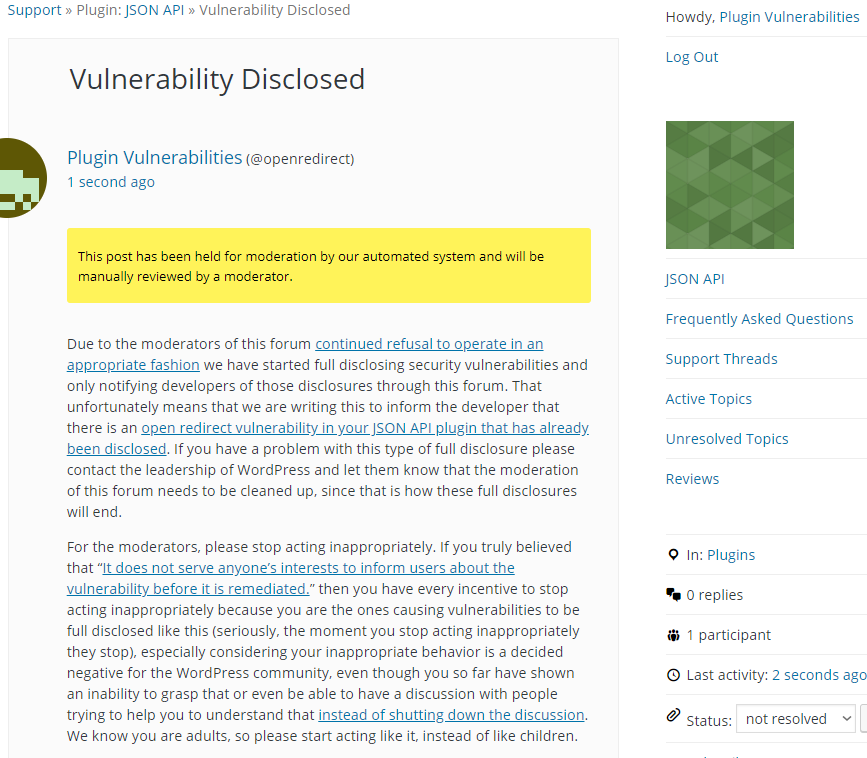Open Redirect Vulnerability in JSON API
In looking over some of the instances where plugins have been run through our Plugin Security Checker tool and have been flagged for possibly containing open redirect vulnerabilities what we have usually found that these lead to vulnerabilities of that are limited in scope, say the redirect can only occur for logged in Administrators. With the plugin JSON API, which someone checked with the tool recently, there isn’t any restriction.
The plugin registers the function template_redirect() to run during template_redirect, so when frontend pages load:
9 | add_action('template_redirect', array(&$this, 'template_redirect')); |
In that function, if you pass the right input, an example is shown in the proof of concept below, it will call the function respond():
62 | $this->response->respond($result); |
That function, which is located in the file /singletons/response.php, will by default redirect to the URL specified by the GET or POST input “redirect_ok”:
77 78 79 80 81 82 83 84 85 86 87 88 89 90 91 | function respond($result, $status = 'ok', $http_status = 200) { global $json_api; $json = $this->get_json($result, $status); $status_redirect = "redirect_$status"; if ($json_api->query->dev || !empty($_REQUEST['dev'])) { // Output the result in a human-redable format if (!headers_sent()) { header('HTTP/1.1 200 OK'); header('Content-Type: text/plain; charset: UTF-8', true); } else { echo '<pre>'; } echo $this->prettify($json); } else if (!empty($_REQUEST[$status_redirect])) { wp_redirect($_REQUEST[$status_redirect]); |
It looks like the redirect is only intended to be to a page on the website, so an open redirect could be avoided by using the wp_safe_redirect() function instead, which restricts where the redirect can occur to.
Full Disclosure
Due to the moderators of the WordPress Support Forum’s continued inappropriate behavior we are full disclosing vulnerabilities in protest until WordPress gets that situation cleaned up, so we are releasing this post and then leaving a message about that for the developer through the WordPress Support Forum. You can notify the developer of this issue on the forum as well. Hopefully the moderators will finally see the light and clean up their act soon, so these full disclosures will no longer be needed (we hope they end soon). You would think they would have already done that, but considering that they believe that having plugins, which have millions installs, remain in the Plugin Directory despite them knowing they are vulnerable is “appropriate action”, something is very amiss with them (which is even more reason the moderation needs to be cleaned up).
Update: To clear up the confusion where developers claim we hadn’t tried to notify them through the Support Forum (while at the same time moderators are complaining about us doing just that), here is the message we left for this vulnerability:
Is It Fixed?
If you are reading this post down the road the best way to find out if this vulnerability or other WordPress plugin vulnerabilities in plugins you use have been fixed is to sign up for our service, since what we uniquely do when it comes to that type of data is to test to see if vulnerabilities have really been fixed. Relying on the developer’s information, can lead you astray, as we often find that they believe they have fixed vulnerabilities, but have failed to do that.
Proof of Concept
The following proof of concept will redirect you to our homepage, when logged in to WordPress.
Make sure to replace “[path to WordPress]” with the location of WordPress.
http://[path to WordPress]/?json=core&redirect_ok=https://www.pluginvulnerabilities.com

I’ve read your post in detail and can’t actually determine what the vulnerability is. Will this enable:
a) A non-logged in person to access restricted content?
b) A non-logged in person to access the admin page?
c) Somebody to a page they weren’t expecting?
We can only duplicate (c). Please explain further.
Thanks in advance,
Rich
As mentioned right in the the title it is an open redirect vulnerability. If you have further questions about what are implications of that, that is a good reason to sign up for our service as we are always happy to help customers understand what are the implications of vulnerabilities in plugins they use.